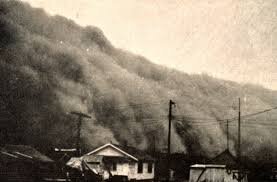COVID-19: Great Depression Rerun?
*Here’s a sample article of what you will find when you become a British Columbia Chronicles Subscriber!
There was an old house in Victoria West, immediately beside Tillicum Road and just a block or so shy of the Burnside Road intersection, that my mother would point out to me from time to time. The fact that she repeated herself told me that she had reason to remember it well. Once operated as a Relief store, it was where, as a child, her parents, armed with a relief voucher from some government agency or church, had bought her a “new” Christmas coat.
That was back in the—so-called—‘Great’ Depression.
Unemployed trying to earn some money by selling apples on a city street.
I’m sure you’ve heard of it. Also known as the Dirty Thirties, what began with a crash on the Wall Street stock market at the end of October 1929 ended up devastating much of the world for almost a decade. It was an economic and social depression such as the world had never known before and it only ended when the western nations began to rearm themselves for an approaching Second World War.
All of the more recent financial bumps such as the dot.com and sub-prime mortgage travesties pale (I say that with respect) alongside the Great Depression of 90 years ago. Certainly the runaway inflation of the 1980s that forced people to walk away from their mortgages must have been a bitter aftertaste of what their parents and grandparents had experienced in the ‘30s.
Canadian and American Prairies were devastated by dust storms that drove entire families off their land.
Even Mother Nature conspired against already struggling farmers during the ‘Dirty ‘30s.’
Unlike today’s pandemic it was the crash of the New York stock market that sent the entire western world into a spiral that lasted 10 years and only ended with the start of the Second World War.
At least 25 per cent of the North American workforce were unemployed; these men are lucky to have found a friendly soup kitchen.
Everyone has seen photos of back then: the unemployed men, thousands of them, who “rode the rails” across Canada while looking for work; and the pictures of “Bennett buggies” (motor-less Model T’s drawn by horses and derisively named for Prime Minister R.B. Bennett who was an unsympathetic multi-millionaire); of government relief camps that provided room and bed and a pittance (cigarette money) in exchange for working on the roads, or fighting forest fires or providing other minimal government services. And when, finally, driven to desperation by years of government insensitivity, incompetence and impotence, 100s of the unemployed organized and set out to march on Ottawa in protest, they were stopped short in Regina when police opened fire. Only two died that day but it was made clear to the “rioters” that if they continued eastward they’d be brutally crushed upon reaching Winnipeg.
That was the era that Nature joined in the bloodletting by turning much of the Canadian and American plains into dust bowls and driving entire families from their farms to join the westward trek (British Columbia has always been Canada’s California) in search of employment or Relief (that word again). American author John Steinbeck immortalized some of these refugees known as “Okies’ in his classic book of fiction Grapes of Wrath. Canadian historians Barry Broadfoot and James H. Gray captured some of the lingering pain of real Depression survivors in their respective books, The Depression Years and The Winter Years.
In short, the Dirty Thirties were all of that and more.
How the current economic meltdown will ultimately resolve itself remains to be seen. There was no social safety net in those days, nothing like what the federal and provincial governments are trying to do today to support employment and businesses, to keep Canadians who’ve lost their jobs from losing the roofs over their heads. Somewhere down the road the hangover from the governments’ multi-billion dollar support package of the battered economy is going to be painful and lengthy. We’re in uncharted waters. But I’ll leave that to the experts and, like everyone else, try to stay healthy and ride out the storm as best I can.
For all those who, like me, have taken a financial hit thanks to COVID-19, I empathize. Times will get better but how long it’s going to take remains to be seen. And, unlike Canadians in the 1930s, most of us are saddled with debt...
I hope that those Canadians who are healthy, who haven’t missed a day’s pay or lost their jobs, whose only inconvenience so far is having to stand in a line-up or to try to buy groceries from an empty supermarket shelf, or put their travel plans on hold, appreciate just how lucky they are.
Will the coming economic correction be anything like the Great Depression?
I leave you with this anecdote from the late Ozzie Hutchings. His father had been a provincial policeman; in other words he had a job through the 1930s even though he’d had to take a 20 per cent cut in pay. So times were tight even for a low-paid government employee.
How tight? One day a very young Ozzie Hutchings asked his dad for a dime to buy something. His father had looked away as he replied, with an obvious choke in his voice, “Son, if I had a dime I would give it to you.”
Have a question, comment or suggestion for TW? Use our Contact Page.
Subscribe to The Chronicles
Want to read more articles like this? Subscribe and receive expanded weekly articles, special gifts and more.
Only $24/year (50c a week)!





